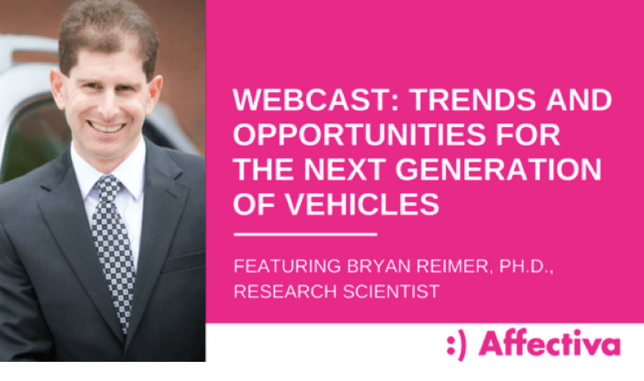For decades, automation has played a key role in the automotive industry, helping cars evolve in order to make drivers’ jobs easier. Today, the industry is looking to automation and AI to simplify the transportation experience yet again, be it through semi-autonomous vehicles, driver assistance solutions in human-operated cars, or the like. But, as we face this latest evolution in automation, there’s a crucial need to understand how the relationship between people and vehicles is shifting, and how the definition of responsibility behind the wheel is changing accordingly.
These questions were at the heart of a recent Affectiva webcast, “The Future of Mobility: Trends and Opportunities for the Next Generation of Vehicles,” that we hosted last week with Dr. Bryan Reimer. As a Research Scientist in the MIT AgeLab and the Associate Director of The New England University Transportation Center at MIT, Dr. Reimer is doing fascinating work studying how people, technology, and vehicles coexist in real-world, on-the-road environments.
Dr. Reimer joined the webcast to provide an overview of the challenges at hand for automotive OEMs, technology companies, policymakers, regulators, and drivers themselves, as vehicles continue to evolve with AI and automation at the center.
Driver Monitoring and Distraction
Already today, there are challenges with driver distraction – from texting, to fatigue, and the like. This challenge will become increasingly complex as technology becomes more and more present in vehicles – both in terms of the ever-growing number of connected devices we have on our person at a given time, and with the maturation of the sophisticated software systems that cars themselves are becoming.
So, as Dr. Reimer explained, the key to the future is developing a deeper, human-centered consideration of attention management behind the wheel. Without a broader look at how we can help drivers make better decisions, and how we can educate people on what they need to do behind the wheel versus what behaviors they shouldn’t do, we won’t be able to address the drowsy, distraction and technology influx epidemic.
While some driver monitoring systems exist on the road today, they’re largely rudimentary systems. AI, computer vision, deep learning, and massive amounts of data will be key in order to help these systems understand complex human states, and with the utmost accuracy. That’s a challenge we’re passionate about trying to solve at Affectiva, as we believe that Emotion AI can give invaluable insight into driver states. And it’s not just about retroactively analyzing data. As cars become more sophisticated, they will increasingly be able to intervene or alert drivers if a driver’s behavior is unsafe, or the system detects distraction. So, the development of these systems will play a big role in the safety of driving today, and in the cars of the future as well.

Collaboration and Knowledge - Sharing as the Way Forward
Dr. Reimer’s presentation also shed light on the role that organizations across industries will play in the evolution of transportation. Undeniably, autonomous vehicles – whether semi or fully autonomous – will majorly disrupt societal structures and systems in everyday life. So, government entities and policymakers will need to (and have already begun to) address how laws must change accordingly, considering issues such as: who bears responsibility in a crash, when you eliminate the human driver? The person in the car? The technology company? The carmaker? Or, how do we define “safety” and “trust” in automated vehicles, and how do we reach that threshold? How “safe” is really “safe enough”? And finally, what do roads and cars of the future look like, when people are no longer tasked with having their hands on the wheel?
There are more questions than answers when thinking about what the future of mobility and transportation will look like. But one thing is clear: there needs to be a swift collaboration between industry, policymakers and regulators in order to prepare people and society for how transportation is beginning to change.
Data collection and analysis will also play a key role in informing the technical, safety and regulatory considerations that arise throughout the evolution of mobility, and work like Dr. Reimer’s as well as what we’re working on at Affectiva take steps to helping us arrive at this understanding. But we can’t do it alone. As OEMs, academics, technology companies and the like begin to implement driver monitoring systems, or aggregate data from AI, we need to encourage constant sharing of that data, analysis, and collaboration, in order to ensure that we enjoy the benefits that automation and AI have to offer the automotive industry, without jeopardizing safety, standards or ethics.
Driving Ahead
We look forward to future conversations and contributions, as we work to apply our Emotion AI technology to the automotive industry in order to help solve some of the industry’s toughest challenges on the road to the future of mobility.
Thanks again to Dr. Reimer, and to all who registered and attended the webcast last week. If you missed it, don’t worry – you can access the full recording here.







